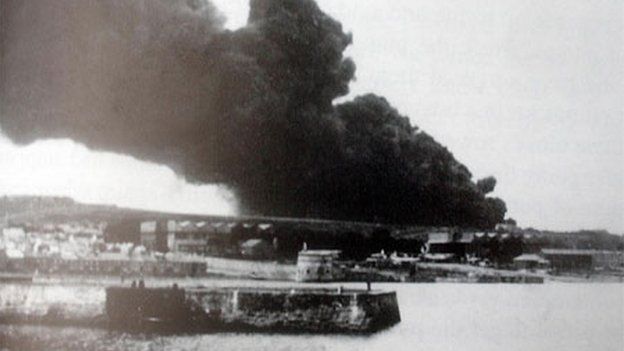75th anniversary of WW2 Pembroke Dock oil bombing fire
- Published

Seventy five years ago three Luftwaffe planes bombed a Pembrokeshire town - sparking what is believed to have been the UK's largest blaze since the Great Fire of London.
The three German Junkers, escorted by two ME 109 fighters, targeted Admiralty oil tanks above Pembroke Dock, with the resulting blaze lasting 18 days.
More than 22 brigades and 650 men from across the UK were needed to quell it, with five from Cardiff losing their lives.
A remembrance service took place in Pembroke Dock on Wednesday, as those who lived through the inferno recalled the stark scenes at the time.
On Monday 19 August 1940, the German planes crept along the Pembrokeshire coast, taking aim at tanks holding millions of gallons of vital fuel after 15:00 BST.
Ted Owens, 91, was a 16-year-old messenger boy for the Pembroke Dock Fire Brigade at the time of the World War Two strike.
"I actually seen the bombs dropping and hit the tanks," he said. "The next thing, we have seen these four black things coming down - huge explosions."
One of the 12-tonne tanks caught alight and the blaze spread, despite the efforts of fire chief Arthur Morris and his team of part-time firefighters, with hurried appeals sent out to brigades across the country.
Crews from south and west Wales were joined by others from as far away as Birmingham, Bristol and Gloucester, as the blaze took hold.
Pall of smoke
"You could see this pall of black smoke going up and into the air," Mr Owens said, adding it was believed the cloud was visible from Swansea.
Former Swansea firefighter and historian Keith Mills said those battling the blaze were ill-equipped compared to today's services.
"This is in the days of the auxiliary firefighters, basically men off the street who were trained locally," he said.
"If you look at their kit, it was nothing short of a boiler suit, a pair of Wellie boots and the tin hats that soldiers wore in the war. The lucky ones had an oilskin as well."
Ted Owens, 91, who was a Pembroke Dock Fire Brigade messenger boy in 1940, speaks to BBC Wales' Sarah Moore
Mr Mills said the heat would have been unimaginable, with the sky turned black as night in the middle of the day.
"Their bravery must have been incredible," he said of the fire crews, pointing out that 23 awards were later handed out for their courage.
In total, the blaze caused 1,100 injuries with dozens of firefighters hurt and overcome with exhaustion.
The five killed - Frederick George Davies, Clifford Miles, Ivor John Kilby, Trevor Charles Morgan and John Frederick Thomas - are remembered on a memorial at the site of the inferno.
Of the 18 tanks at the Llanreath Oil Tank Depot, 11 were destroyed and 33 million gallons of oil lost before the fire was eventually extinguished in September, 1940.
The fire was soon to be eclipsed by others in London, Coventry and Birmingham, as the German bombing offensive gathered momentum, but its impact on Pembroke Dock has endured.
The Sunderland Trust, which runs Pembroke Dock Heritage Centre in the Royal Dockyard Chapel, held a remembrance service on Wednesday at 11:00 BST.
An exhibition is also being held and will feature demonstrations by Mid and West Wales Fire and Rescue Service and artefacts such as a handwritten diary account of the blaze.
- Published23 October 2014
- Published20 October 2010